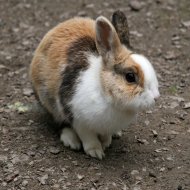Small furries still misunderstood, says charity

Basic care mistakes are still being made, such as housing pets with the wrong species and providing the wrong housing or bedding.
More work needs to be done to improve the care of the UK's small furry pets, according to staff at Wood Green, the Animals Charity.
While the care of pets such as rabbits and guinea pigs has improved, the charity says many owners continue to make basic mistakes, including underestimating the cost of keeping them. Lifetime costs can average more than £5,500 not including the cost of any emergency veterinary treatment.
Marie Channer, Wood Green's head of small animals, said owners often mistakenly believe a small furry pet will be easier and cheaper than a dog or cat.
She added: "Sadly we still see so many very basic mistakes being made which could impact hugely on small animal wellbeing, such as accommodation being too small, supplying the wrong bedding, and even pets housed alongside the wrong species.
"So, although we have seen big positive changes over the years, there is still so much more work to be done to educate the small pet owners of the UK."
The charity attended the National Pet Show in Birmingham to give presentations and help advise owners on the health, diet, housing and companionship needs of small pets. The stand also featured a guinea pig garden filled with pet friendly plants and 10 of the charity's guinea pig residents.



 The latest
The latest